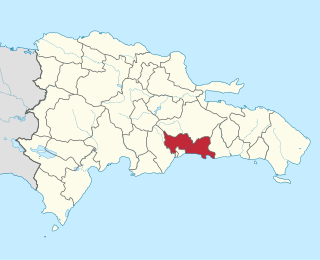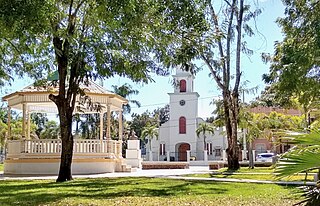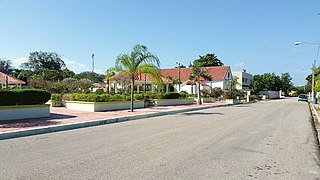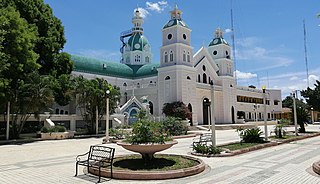
Santo Domingo, once known as Santo Domingo de Guzmán, known as Ciudad Trujillo between 1936 and 1961, is the capital and largest city of the Dominican Republic and the largest metropolitan area in the Caribbean by population. As of 2022, the city and immediate surrounding area had a population of 1,029,110 while the total population is 3,798,699 when including Greater Santo Domingo. The city is coterminous with the boundaries of the Distrito Nacional, itself bordered on three sides by Santo Domingo Province.

San Cristóbal is a province in the southern region of Dominican Republic, located west of the capital Santo Domingo. With approximately 642,000 inhabitants, it is the fourth most populated province in the country, only behind Santo Domingo, Santiago and the National District. It borders the provinces Monseñor Nouel (north), Monte Plata (northeast), Santo Domingo (east), Peravia (west) and San José de Ocoa (northwest). The Caribbean Sea borders the province to the south. The provincial capital is the city of San Cristóbal.

The Mirabal sisters were four sisters from the Dominican Republic, three of whom opposed the dictatorship of Rafael Trujillo and were involved in activities against his regime. The three sisters were assassinated on 25 November 1960. The last sister, Adela, commonly known as Dedé, who was not involved in political activities at the time, died of natural causes on 1 February 2014.

The Dominican Republic is divided into thirty-one provincias, while the national capital, Santo Domingo, is contained within its own Distrito Nacional.

Dajabón is a northwestern province which currently comprises one of the 32 provinces of the Dominican Republic. It is divided into 5 municipalities and its capital city with the same name. It is bordered by the provinces of Monte Cristi to the north, Santiago Rodríguez to the south, Elías Piña to the south and the Nord-Est department of Haiti to the west.

Duarte is a northeastern province which comprises one of the 32 provinces of the Dominican Republic. It is divided into 7 municipalities and its capital city is San Francisco de Macorís. It is bordered by the provinces of María Trinidad Sánchez and Samaná to the east, Monte Plata and Sánchez Ramírez to the south, La Vega and Hermanas Mirabal to the west and Espaillat to the north. It is named after Juan Pablo Duarte, the founder of the Dominican Republic.

La Vega is one of the 32 provinces of the Dominican Republic. It is located in the Cibao Valley, the north-central region of the country, and is divided into 4 municipalities with its capital city being the namesake of La Vega. The province borders Espaillat and Hermanas Mirabal to the north, Duarte to the east, Monseñor Nouel to the south and Santiago to the west.

Monte Cristi is a province in the northwest of the Dominican Republic. The capital city is San Fernando de Monte Cristi. The spelling Montecristi is also seen. The Montecristi province is located in the Cibao frontier region, on the north coast of the country and borders the nation of Haiti. The land area of the Montecristi province is 1,924.35 km2. It is divided into six municipalities and four municipal districts.

Monte Plata is an eastern province of the Dominican Republic, and also the name of its capital city. It was split from San Cristóbal in 1992.

Hermanas Mirabal is a province of the Dominican Republic. It was split from Espaillat Province in 1952 and was originally called Salcedo, the name of its capital city; it is still referred to by this name sometimes.

Santo Domingo is a province of the Dominican Republic. It was split from the Distrito Nacional on October 16, 2001.

Comendador is the capital of the Elías Piña province of the Dominican Republic. It has a border crossing to the Haitian town Belladère.

Dajabón is a municipality and capital of the Dajabón province in the Dominican Republic, which is located on the northwestern Dominican Republic frontier with Haiti. It is a market town with a population of about 26,000, north of the Cordillera Central mountain range.

San Francisco de Bánica, or simply Bánica, is a town and municipality in the northwest region of Dominican Republic in the Elías Piña province. It is located on the border with Haiti near the Artibonite river. The name Bánica comes from the Taíno name of the region, Banique.
Santo Domingo Norte is a municipality of the Santo Domingo Province in the Dominican Republic. There is one municipal district within the municipality: La Victoria.

San Juan de la Maguana is a city and municipality in the western region of the Dominican Republic and capital of the San Juan province. It was one of the first cities established on the island; founded in 1503, and was given the name of San Juan de la Maguana by San Juan Bautista and the Taino name of the valley: Maguana. The term Maguana means "the first stone, the unique stone".
Hondo Valle is a town in the Elías Piña province of the Dominican Republic characterized by its beautiful mountains and cold climate.

Dr. Jaime David Fernandez Mirabal is a Dominican psychiatrist, agronomist, and politician.

















